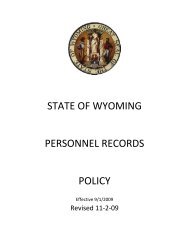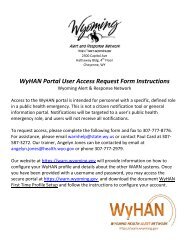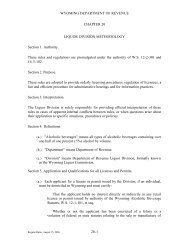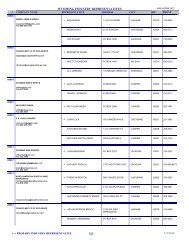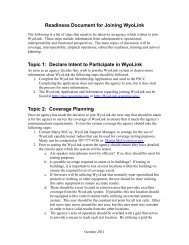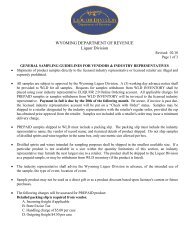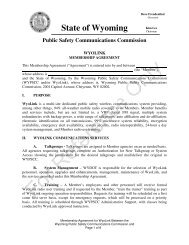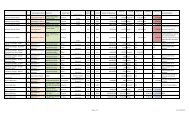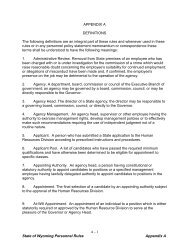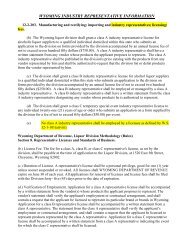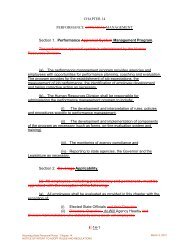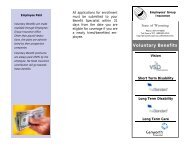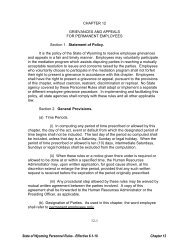State of Wyoming Substance abuse Policy
State of Wyoming Substance abuse Policy
State of Wyoming Substance abuse Policy
Create successful ePaper yourself
Turn your PDF publications into a flip-book with our unique Google optimized e-Paper software.
Execati.ve Order 1990-<br />
STATE OF WYOMING<br />
SUBSTANCE ABUSE POLICY<br />
I. Purpose - Employees are <strong>Wyoming</strong> <strong>State</strong> Government's most valuable resource and their<br />
health and safety is a' major concern. <strong>Substance</strong> <strong>abuse</strong> is a national crisis which has detrimentally<br />
affected the lives <strong>of</strong> many citizens and has adversely affected the work place. The <strong>State</strong> <strong>of</strong><br />
<strong>Wyoming</strong> will not tolerate substance <strong>abuse</strong> or use which affects the health and well-being <strong>of</strong> its<br />
employees or threatens its service to the public.<br />
The <strong>State</strong> <strong>of</strong> <strong>Wyoming</strong> is committed to maintaining a safe and healthy work force, free from the .<br />
influence <strong>of</strong> substance <strong>abuse</strong>. Additionally, the <strong>State</strong> <strong>of</strong> <strong>Wyoming</strong> will comply with the<br />
requirements <strong>of</strong> the f=ederal Drug-Free Work Place Act <strong>of</strong> I986,<br />
The use <strong>of</strong> illegal drugs and <strong>abuse</strong> <strong>of</strong> controlled substances, on or <strong>of</strong>f duty, is illegal. Employees<br />
who use illegal drugs or <strong>abuse</strong> controlled substances or alcohol, on or <strong>of</strong>f duty, may be less<br />
productive, less reliable and prone to absenteeism resulting in increased cost, delay and risk in<br />
providing services. Ultimately, they may threaten the <strong>State</strong>'s ability to effectively and safely<br />
service the public.<br />
2. <strong>Policy</strong> - it is the policy <strong>of</strong> the <strong>State</strong> <strong>of</strong> <strong>Wyoming</strong> to maintain a work place free <strong>of</strong> substance<br />
<strong>abuse</strong>.<br />
• Reporting to work or performing work for the <strong>State</strong> while impaired by or under the<br />
influence <strong>of</strong> illegal drugs or alcohol is prohibited. Testing for drug or alcohol use is not<br />
required in determining whether an employee is impaired by or under the influence <strong>of</strong><br />
drugs or alcohol. Eyewitness evidence <strong>of</strong> unusual behavioral and physical signs and<br />
symptoms can be used to determine whether an employee is impaired or under the<br />
influence <strong>of</strong> drugs or 'alcohol.<br />
• The illegal use, possession, dispensation, distribution, manufacture, or sale <strong>of</strong> a<br />
controlled substance by an employee in the work place is prohibited.<br />
Violation <strong>of</strong> such prohibitions by an employee shall result in discipline in accordance with<br />
the <strong>State</strong> <strong>of</strong> <strong>Wyoming</strong> Personnel Rules and applicable agency policies and procedures.<br />
• The conviction <strong>of</strong> an applicant or employee for the illegal use, possession, dispensation,<br />
distribution, manufacture, or sale <strong>of</strong> a controlled substance outside the work place shall<br />
be taken into consideration in determining job qualifications or in administering<br />
disciplinary action up to and including dismissal.<br />
• Employees shall notify their agency <strong>of</strong> any criminal drug statute conviction not later than<br />
five (5) days after such conviction.<br />
• Agencies that receive federal grants or contracts must report any criminal drug statute<br />
convictions <strong>of</strong> their employees engaged in the performance <strong>of</strong> a federal grant or contract,<br />
to federal agencies from which grants or contracts are received within ten (10) days after<br />
receiving notice from the employee or otherwise receives actual notice <strong>of</strong> such<br />
conviction.
All employees shall be given a copy <strong>of</strong> the <strong>Substance</strong> Abuse <strong>Policy</strong>. Employees shall be<br />
informed that they must abide by the terms <strong>of</strong> the policy as a condition <strong>of</strong> employment<br />
and <strong>of</strong> the consequences <strong>of</strong> any violation <strong>of</strong> such policy,<br />
3, Awareness Program - <strong>State</strong> agencies shall inform employees about the dangers <strong>of</strong> substance<br />
<strong>abuse</strong> by establishing a <strong>Substance</strong> Abuse Awareness Program. The <strong>Substance</strong> Abuse<br />
Awareness Program shall contain provisions to Inform employees about the: (1) dangers <strong>of</strong><br />
alcohol and drug <strong>abuse</strong>; (2) <strong>State</strong> <strong>of</strong> <strong>Wyoming</strong> <strong>Substance</strong> <strong>abuse</strong> <strong>Policy</strong>; (3) availability <strong>of</strong> effective<br />
treatment and counseling for employees who voluntarily seek such assistance; and (4) sanctions<br />
the <strong>State</strong> will impose for violations <strong>of</strong> its <strong>Substance</strong> Abuse <strong>Policy</strong>. Sanctions imposed shall be<br />
done in accordance with the <strong>State</strong> <strong>of</strong> <strong>Wyoming</strong> Personnel Rules<br />
SUBSTANCE ABUSE POLICY GUIDELINES<br />
The purpose <strong>of</strong> these guidelines Is to assist <strong>State</strong> agencies in the administration <strong>of</strong> the <strong>State</strong>`s<br />
substance <strong>abuse</strong> policy. The policy statement is a written description <strong>of</strong> the <strong>State</strong>'s position<br />
regarding substance <strong>abuse</strong> and the guidelines were developed to provide guidance In supporting<br />
that position. Questions concerning the <strong>State</strong>'s substance <strong>abuse</strong> policy and these guidelines<br />
should be directed to the <strong>State</strong> Human Resources Division.<br />
<strong>Substance</strong> Abuse <strong>Policy</strong> Definitions:<br />
(1) "<strong>Substance</strong>" means alcohol or drugs.<br />
(2) "Alcohol" means ethyl . alcohol or ethanol,<br />
(3) "Drugs" means any substance including controlled substances and<br />
prescription drugs, taken into the body, other than alcohol, which may impair<br />
one's mental faculties, change one's mood and/or physical performance.<br />
(4) "Abuse" means:<br />
a. Any use <strong>of</strong> an Illegal drug:<br />
b, Misuse <strong>of</strong> any over-the-counter drug in cases where such<br />
misuse impairs job performance;<br />
c. Use <strong>of</strong> any prescription drug in a manner Inconsistent with its<br />
medically prescribed Intended use, or under circumstances<br />
where use is not permitted;<br />
d. Use <strong>of</strong> alcohol where use impairs job performance; and<br />
(5) "Work Place" means a <strong>State</strong>-owned or utilized premise for <strong>of</strong>ficial <strong>State</strong><br />
business. This also Includes <strong>State</strong>-owned vehicles and personal vehicles which<br />
are being used to conduct <strong>State</strong> business,<br />
(6) "Controlled <strong>Substance</strong>" means a drug, substance, or immediate precursor in<br />
schedules I through V <strong>of</strong> Article ill <strong>of</strong> the <strong>Wyoming</strong> Controlled <strong>Substance</strong>,Act <strong>of</strong><br />
1.971.<br />
Federal and <strong>State</strong> Handicapped Discrimination Laws
<strong>State</strong> agencies which receive federal financial assistance are covered by the handicapped<br />
discrimination in employment provisions <strong>of</strong> the Vocational Rehabilitation Act <strong>of</strong> 1973. All <strong>State</strong><br />
agencies must comply with the <strong>Wyoming</strong> Fair Employment Practices Act <strong>of</strong> 1965, which prohibits<br />
discrimination in employment on the basis <strong>of</strong> handicap. Under the above laws, a "handicapped"<br />
person means any person who has a physical or mental impairment which substantially limits one<br />
or more major life activities, has a record <strong>of</strong> such impairment, or is regarded as having such an<br />
impairment.<br />
Drug addiction and alcoholism are "physical or mental impairments" within the meaning <strong>of</strong> state<br />
and federal laws. Therefore, employees addicted to drugs and/or alcohol are handicapped if their<br />
impairment substantially limits one <strong>of</strong> their major life activities and have a record <strong>of</strong> such<br />
impairment or are regarded as having such impairment. it must be emphasized that the state and<br />
federal laws and regulations apply only to discrimination against qualified handicapped persons.<br />
The fact that drug addiction and alcoholism may be handicaps does not mean that these<br />
conditions must be ignored in determining whether an individual is qualified for employment<br />
opportunities.<br />
An agency may hold an employee addicted to drugs and/or alcohol to the same standard <strong>of</strong><br />
performance and behavior to which they hold others, even if any unsatisfactory performance or<br />
behavior is related to the person's drug addiction or alcoholism. While an employee addicted to<br />
drugs and/or alcohol may not be denied employment or adversely affected solely because <strong>of</strong> his<br />
or her addiction, the behavioral manifestations <strong>of</strong> the condition may be taken into account in<br />
determining whether he or she is qualified.<br />
An agency does not have to hire an applicant with a known addiction to drugs or alcohol when the<br />
addiction prevents successful job performance. An agency may consider, for all applicants and<br />
employees, past work history, absenteeism, disruptive, abusive or dangerous behavior, violations<br />
<strong>of</strong> rules or laws, and unsatisfactory work performance in determining suitability for employment.<br />
Agencies shall enforce rules prohibiting the possession or use <strong>of</strong> alcohol ar illegal drugs in the<br />
work place equally and in a nondiscriminatory manner.<br />
Both state and federal laws require an employer to make a reasonable accommodation to the<br />
known physical or mental limitations <strong>of</strong> a handicapped applicant or employee unless the employer<br />
can demonstrate that the accommodation would Impose an undue hardship. Where a<br />
handicapped person Is not qualified to perform a particular job, where reasonable<br />
accommodation does not overcome the effects <strong>of</strong> a person's handicap, or where reasonable<br />
accommodation causes undue hardship to the employer, the failure to hire or promote the<br />
handicapped person will not be considered discrimination. Reasonable accommodations may<br />
include modification <strong>of</strong> work schedules, including part-time employment, job restructuring or<br />
granting authorized leave to enroll in and attend a treatment program.<br />
<strong>Policy</strong> Dissemination<br />
Agency heads should ensure that all employees are informed <strong>of</strong> the <strong>State</strong>'s substance <strong>abuse</strong><br />
policy and implementing guidelines. Supervisors should be trained in monitoring and .<br />
documenting behaviors affected by substance <strong>abuse</strong>, such as attendance, presence at the work<br />
site, alertness, safety practices, quality and quantity <strong>of</strong> work, and personal interactions with<br />
clients, co-workers, and the public.<br />
Documentation<br />
Documenting incidents involving possible substance <strong>abuse</strong> in the work place is necessary in<br />
identifying and effectively dealing with the problem. Proper documentation is essential in<br />
providing assistance to an employee or, If necessary, justifying disciplinary action. The following<br />
steps should be taken to assure that proper documentation is made:
• Document signs <strong>of</strong> unusual behavior and deteriorating Job performance <strong>of</strong> each<br />
employee. Although the <strong>abuse</strong> <strong>of</strong> drugs er alcohol are personal problems, it becomes<br />
important to management when it affects the employee's job performance.<br />
• Be specific in documenting when and where you observe signs <strong>of</strong> unusual behavior and<br />
deteriorating job performance. The date, time and place <strong>of</strong> such Incidents is necessary<br />
for proper documentation. Note exactly what you observe concerning the employee 's<br />
conduct.<br />
• Where possible, Include any supporting evidence to substantiate drug <strong>abuse</strong> or alcohol<br />
use. If there are other witnesses, it is important to note who they are and record their<br />
comments. If an employee admits to drug or alcohol use, record his/her exact response.<br />
• Retrieve and preserve any physical evidence which you suspect may be alcohol or an<br />
illegal drug, Note the time and place when this was done so the exact nature <strong>of</strong> the<br />
substance can be accurately identified.<br />
Document the date and time that any signs <strong>of</strong> unusual behavior and deteriorating job<br />
performance are discussed'with an employee and record the content <strong>of</strong> the discussion.<br />
Treatment Referral<br />
When it appears that personal problems associated with substance <strong>abuse</strong> may be impacting job<br />
performance, management should assist the employee. If discussions do not succeed in<br />
changing the worker's behavior, management should;<br />
▪<br />
▪<br />
Express genuine concern to the employee about the lack <strong>of</strong> noticeable improvement,<br />
identify and explain the substandard work performance.<br />
• Inform the employee that if the problem is personal, it is the employee's responsibility to<br />
resolve it.<br />
• Call attention to the availability <strong>of</strong> community resources that <strong>of</strong>fer confidential assistance<br />
for personal problems.<br />
• Emphasize that lack <strong>of</strong> improvement in job performance could lead to disciplinary action.<br />
• Diagnosis <strong>of</strong> alcohol or drug-related treatment problems can only be made by persons<br />
having the appropriate training and qualifications. Therefore, referral (other than selfreferral)<br />
for diagnosis, counseling, and/or treatment should be based solely on identified<br />
and documented work performance deficiencies.<br />
Self-referrals, as well as management referrals, to counseling and/or treatment should be<br />
afforded maximum respect for individual confidentiality consistent with safety and security<br />
issues.<br />
• An employee's job should not be jeopardized in any manner solely because <strong>of</strong> referral for<br />
diagnosis, counseling or treatment. Agency management should consider the operational<br />
needs <strong>of</strong> the agency in authorizing leaves <strong>of</strong> absence for diagnosis, counseling, and<br />
treatment. .<br />
Disciplinary Action
Violation <strong>of</strong> the substance'<strong>abuse</strong> policy, which has been properly documented and substantiated,<br />
shall be considered just cause for disciplinary action in accordance with the <strong>State</strong> <strong>of</strong> <strong>Wyoming</strong><br />
Personnel Rules,<br />
(Refer to state <strong>of</strong> <strong>Wyoming</strong> Personnel Rules, December 7, 2001, Chapter 1, Section 8)
Section 8. <strong>Substance</strong> Abuse.<br />
(a) <strong>Policy</strong>, It is the policy <strong>of</strong> the <strong>State</strong> <strong>of</strong> <strong>Wyoming</strong> to maintain a<br />
workplace free <strong>of</strong> substance <strong>abuse</strong>:<br />
1-4<br />
(1) Reporting to work or performing work for the <strong>State</strong> while<br />
impaired by or under the influence <strong>of</strong> illegal drugs or alcohol is prohibited, Testing<br />
for drug or alcohol use is not required in determining whether ars employee is<br />
Impaired by or under the influence <strong>of</strong> drugs or alcohol. Eyewitness evidence <strong>of</strong>.<br />
unusual behavioral and physical signs and symptoms can be used to determine<br />
whether an employee is impaired or under the Influence <strong>of</strong> drugs or alcohol.<br />
(II) The illegal use, possession, dispensation, distribution,<br />
manufacture or sale <strong>of</strong> a controlled substance by an employee In the workplace is<br />
prohibited.<br />
Oil) Violation <strong>of</strong> such prohibitions by an employee shall result iri<br />
discipline in accordance with the <strong>State</strong> <strong>of</strong> <strong>Wyoming</strong> Personnel Rules and<br />
applicable agency policies and procedures,<br />
(iv)The conviction <strong>of</strong> an applicant or employee fur the illegal use,<br />
possession, dispensation, distribution, manufacture or sale <strong>of</strong> a controlled<br />
substance outside the workplace shall be taken into consideration In determining<br />
job qualification or in administering disciplinary action up to and including dismissal.<br />
(v)Employees shall notify their agency <strong>of</strong> any criminal drug statute<br />
conviction not later than five (5) days after such conviction.<br />
(vi)Agencies that receive federal grants or contracts must report<br />
any criminal drug statute convictions <strong>of</strong> their employees engaged in the<br />
performance <strong>of</strong> a federal grant or contract, to federal agencies from which grants<br />
or contracts are received within tan (10) days after receiving notice from the<br />
employee or otherwise receives actual notice <strong>of</strong> such conviction.<br />
(vii)All employees shall be given a copy <strong>of</strong> the <strong>Substance</strong> Abuse<br />
<strong>Policy</strong>. Employees shall be informed that they must abide by the terms <strong>of</strong> the<br />
policy as a condition <strong>of</strong> employment and <strong>of</strong> the consequences <strong>of</strong> any violation <strong>of</strong><br />
such polio/.



